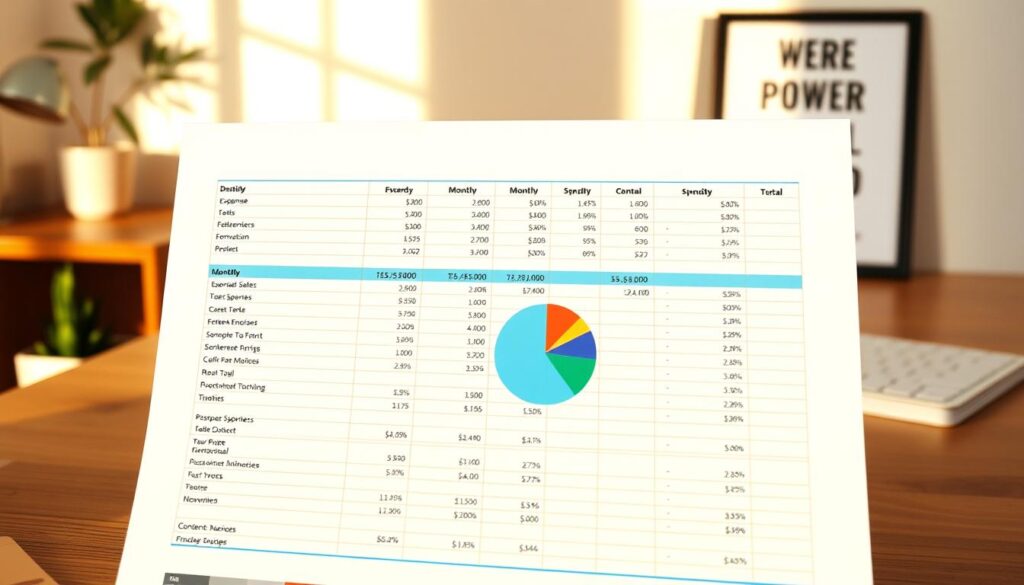Effective money management starts with understanding how to prioritise your expenses. In this article, you will discover valuable budgeting tips that can elevate your financial health. By gaining insight into what distinguishes needs from wants, you can make informed decisions that align with your financial goals.
It’s essential to have a well-structured budget and to regularly review and adjust it as necessary. For further guidance on budgeting strategies, refer to this resource.
Table of Contents
Key Takeaways
- Prioritising essential expenses is key for effective budgeting.
- Understanding the difference between needs and wants streamlines spending.
- Regular budget reviews help align your spending with your financial goals.
- Utilising budgeting frameworks can enhance long-term financial health.
- Tracking your income and expenses is vital for making informed decisions.
- Adapting your budget to lifestyle changes ensures financial resilience.
Understanding the Importance of Budgeting
Budgeting is key to financial stability and peace of mind. It’s important to know what a budget is. A budget is a financial plan that tracks your income and expenses. This helps you manage your money better.
It lets you see where your money goes and make changes to reach your goals.
Defining a Budget
A budget is more than just a list of expenses. It’s about planning how you spend your money. By setting a budget, you can make smart spending choices. This ensures your spending matches your financial dreams.
Benefits of Having a Budget for Your Financial Health
Having a budget brings many benefits for your financial health. It makes tracking your money easier, helping you find ways to save. It also reduces financial stress by giving you a clear view of your finances.
Plus, a budget helps you achieve your financial goals. This could be saving for emergencies or paying off debts. For more on why you need a budget, check out this resource.
Reviewing Your Current Budget
Checking your budget regularly keeps your finances healthy. It helps you stay on track with your money goals. First, figure out how much you earn each month. Include all your regular income and any extra money you make.
Identifying Your Income and Expenses
Make a list of all your income sources. This includes your salary, bonuses, and freelance work. Then, sort out your expenses into fixed and variable costs. This helps you see where your money goes and what changes you might need to make.
Aligning Your Budget with Your Financial Goals
After listing your income and expenses, check if your spending matches your goals. Think about what you want to achieve, like saving for a big purchase. If you’re saving for a house, you might need to spend less on things you don’t really need. Adjust your budget to focus on saving and match your current goals.
| Income Sources | Monthly Amount (£) |
|---|---|
| Salary | 2,500 |
| Freelance Work | 500 |
| Investments | 300 |
| Total Income | 3,300 |
| Expenses Categories | Monthly Amount (£) |
| Rent | 1,200 |
| Groceries | 400 |
| Dining Out | 250 |
| Utilities | 200 |
| Total Expenses | 2,050 |
How to Prioritize Expenses in Your Budget
Prioritising expenses is key to keeping your finances stable. It’s important to know the difference between needs and wants. Needs are things you must have every day, while wants are things you can live without.
To manage your money well, start by sorting your expenses into these two groups.
Distinguishing Between Needs and Wants
To make a balanced budget, figure out which expenses are needs and which are wants. Needs include:
- Housing costs such as rent or mortgage
- Groceries and essential food items
- Healthcare and insurance premiums
- Utilities such as electricity and water
Wants include things like:
- Dining out or takeaways
- Entertainment subscriptions
- New clothing and accessories
- Luxury items or non-essential gadgets
By knowing the difference, you can decide which expenses are really important. This helps you make better choices about how to spend your money.
Evaluating the Impact of Each Expense
After sorting your expenses, it’s time to think about how each one affects your money. Ask yourself:
- Does this expense help me reach my financial goals?
- Is this expense really necessary for me right now?
- Can I cut back on any spending that’s not essential?
By evaluating your expenses, you can save money for things that really matter. Try to spend more on needs and save some for wants that make life better.
Strategies for Effective Budget Allocation
Effective budget allocation is key to financial health. The 50/30/20 rule is a well-known method. It helps you divide your income into needs, wants, and savings. This makes budgeting simpler.
Using the 50/30/20 Rule for Budgeting
The 50/30/20 rule splits your income into three parts. 50% goes to needs like housing and utilities. 30% is for wants, and 20% for savings and debt. It helps you balance spending and saving.
Adjusting Your Budget Based on Changing Priorities
As your finances change, so should your budget. Life events like job changes or family additions might require budget adjustments. Regularly check your priorities to make smart budget changes.
Creating a Debt Strategy
Creating a solid debt strategy is key to taking back control of your finances. By using specific debt management techniques, you can find your way to financial stability more easily. Using different debt reduction strategies can help you clear outstanding balances and make payments simpler.
Methods for Paying Down Debt Quickly
The avalanche strategy is a fast way to pay off debt by focusing on high-interest debts first. This method not only speeds up repayment but also cuts down on interest costs over time. The snowball method, on the other hand, starts with the smallest debts, giving you quick wins and keeping you motivated. Both strategies are great for managing debt in the long run.
Consolidating Debts for Better Management
Merging multiple debts into one can greatly benefit those with many payments to keep track of. This can often get you a lower interest rate, making it easier to manage your finances. It simplifies your payments and helps you keep track of your progress. Knowing about effective debt reduction strategies can also help you achieve financial freedom.
| Debt Management Method | Description | Benefits |
|---|---|---|
| Avalanche Method | Focus on repaying highest interest rate debts first | Reduces overall interest costs faster |
| Snowball Method | Pay off smallest debts first for quick wins | Increases motivation and engagement |
| Debt Consolidation | Combine multiple debts into one loan | Streamlines payments and lowers interest rates |
Saving Tips for Financial Health
Making small changes to your daily habits can greatly improve your finances. By cutting down on daily expenses, you can make big strides towards your financial goals. It’s all about finding ways to save a bit more each day.
Finding Extra Savings in Daily Expenses
Look for ways to save money in your daily life. Try cooking at home instead of eating out, or use public transport. Keeping track of all your spending helps you see where you can cut back.
Think about what you can do without. Do you really need all those subscriptions or coffee shop visits? Using budgeting tools can help you find these savings. For more tips, check out Better Money Habits.
Building an Emergency Fund
Having an emergency fund is key to your financial health. Aim to save three to six months’ worth of living costs. This way, you’re prepared for any unexpected expenses.
Set up automatic transfers to your savings. Even small amounts add up over time. It’s important to plan for emergencies, saving 10% to 15% of your budget for them.
Avoiding Common Budgeting Pitfalls
When you’re dealing with budgets, it’s easy to fall into traps. One big problem is ‘buy now, pay later’ deals. They can make you spend more than you should and get you into debt. Many people find it hard to say no to these tempting offers, not knowing how much they’ll end up paying.
Steering Clear of Buy Now, Pay Later Plans
These deals might look good at first, but they can hide the real cost of things. If you don’t pay off these debts quickly, you could end up in a lot of trouble financially. To avoid these problems, use money you already have instead of credit. Look into budgeting tools that can help you make better financial choices. You can find some here.
Recognising and Adjusting for Lifestyle Inflation
When you earn more, you might spend more too, which is lifestyle inflation. This can make it hard to stick to your budget and reach your money goals. It’s important to notice when your spending goes up.
By adjusting your budget early, you can avoid wasting money. Knowing when your spending changes helps you manage your money better and avoid debt.
Tracking Your Spending Habits
It’s key to watch your spending to budget better. It shows you where your money goes, helping you make smart money choices. By tracking, you can spot spending patterns that help or hurt your financial goals.
Utilising Spending Tracker Apps
Spending tracker apps make tracking easy. They have simple designs for easy use. Apps like Mint, YNAB, and PocketGuard show you where your money is spent.
Using these apps daily helps you stay on track with your budget. They help you adjust to changes in your finances.
Analysing Your Spending Patterns over Time
After tracking, it’s time to look at your spending patterns. This helps you see trends in your spending. For instance, if you often spend too much on dining or entertainment, you can change.
Regularly checking your spending data strengthens your budget. It makes reaching your financial goals easier.
Seeking Help with Financial Planning
Managing money can be tough, mainly if you’re new to budgeting and saving. Getting financial planning help is very useful. A financial advisor can give you advice that fits your needs, helping you reach financial stability.
When to Consult a Financial Advisor
Think about getting help when big life changes happen, like getting married or having kids. These events can change your money situation a lot. A financial advisor can guide you through these changes smoothly.
Resource Recommendations for Money Management
There are many tools to help you manage your money, aside from advisors. Government sites and banks offer great advice on budgeting and saving. Look into these resources to improve your money skills.
Conclusion
Putting expenses in order is key to good financial health. It helps you manage your money well. This means keeping track of what you earn and spend, and adjusting as needed.
Checking your budget often helps you meet your financial goals. It lets you change how you spend money. This way, you can save more and reach your financial dreams. For more tips on budgeting, check out this useful guide.
Budgeting is a journey, not a one-time task. Sticking to your budget and planning ahead boosts your financial future. As your needs change, so should your budget. This keeps you on the path to success.
FAQ
What is the first step in prioritising expenses in my budget?
First, know the difference between needs and wants. This helps you spend on what’s really important and cut back on things you don’t need.
How often should I review my budget?
Review your budget every month. This keeps you on track with your financial goals and lets you adjust as needed.
What are some common budgeting mistakes to avoid?
Avoid spending too much on things you don’t need, ignoring the cost of living, and not tracking your spending. Knowing these mistakes helps you manage your money better.
How can the 50/30/20 rule assist me in budgeting?
The 50/30/20 rule helps you budget by using 50% for needs, 30% for wants, and 20% for savings and debt. It makes budgeting easier and keeps your finances balanced.
What should I include when evaluating my income and expenses?
Include all income, like salaries and side jobs, and all expenses, including fixed costs and discretionary spending. This gives a clear picture of your finances.
How can I create an emergency fund?
Aim to save three months’ worth of living costs. Start small from each paycheck until you reach your goal. This fund helps with unexpected expenses.
What is the avalanche method for paying down debt?
The avalanche method focuses on paying off debts with the highest interest rates first. This saves you money on interest while keeping up with other debt payments.
Why is it important to seek help from a financial advisor?
A financial advisor offers custom advice for managing your money. They’re great if budgeting seems too hard or you need help reaching your financial goals.
How can I effectively track my spending habits?
Use spending tracker apps or tools to categorise your expenses. They help you see spending patterns and find ways to improve your budget.










